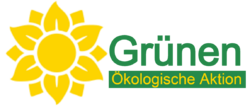Green Party (Ruttland): Difference between revisions
old>Xiaodong No edit summary |
m (1 revision imported) |
Latest revision as of 16:50, 11 March 2019
Green Party Grienpartij | |
|---|---|
 | |
| Chairperson | Freikje Jaarsma |
| Founded | October 24, 1982 |
| Youth wing | Young Greens |
| Membership (2018) | 14,500 |
| Ideology | Green politics Eco-socialism Progressivism Direct democracy Left-wing populism Soft Eucloscepticism |
| Political position | Left-wing |
| International affiliation | PGNM |
| Colors | Green |
| Folkskammer | 22 / 200
|
| Hearskammer | 2 / 75
|
| County Councils | 35 / 564
|
| Euclean Parliament | 1 / 17
|
The Green Party (Ruttish: Grienpartij) is a political party in Ruttland.
Formed in 1982 by students and radicals that grew as a result of the new left and anti-nuclear activism, the Greens were at first a marginal force in Ruttish politics only winning seats in parliament in the 1987 election where it remained a small force, a trend that continued in the 1990's and the early 2000's. In 2000 the party split with the party's conservative wing creating the green liberal Ecological Alternative party. Following the 2005 Ruttish financial crisis and resulting austerity measures the Greens saw their representation double as they became the most vocal critics of the government's austerity policy. Since then the Greens have remained the fourth largest party in Ruttland with the consistent support of 10% of the electorate.
The Greens broadly support green politics, democratic socialism and progressivism, placing them on the left of the Ruttish political spectrum. When formed the Green Party disavowed the left-right spectrum but since 2000 has explicitly identified as a left-wing party.
History
Ideology
The Green Party's original 1982 charter defined the party as adhering to the principles of participatory democracy, social justice, sustainability, ecosophy, equality and animal rights. Since than the principles of socialism and feminism have also been added whilst participatory democracy has been amended to direct democracy.
When founded the Green party was influenced both by socialist, left-libertarian, liberal and progressive Christian influence. The party traditionally emphasised its environmental policies whilst supporting social liberalism (such as the promotion of LGBT rights, liberalising drug laws and supporting multiculturalism) being more divided on economic affairs. The party was also traditionally divided between radical and governmental wings, the latter who wished to maintain the party as a party of the grassroots whilst the latter was more supportive of cooperating with establishment parties such as the Cooperative Party. The party was also divided over the status of the Euclean Community.
Since the 2000 split the party has moved to the left on most issues opposing austerity, identifying itself as a democratic socialist party. The Greens have also been more supportive of direct democracy with the increased use of referenda. Since EC imposed austerity measures the Greens have also shifted to support a soft Euclosceptic approach criticising EC sponsored bailouts and resultant economic readjustment programmes.
The Greens specific policy proposals include phasing out nuclear and fossil fuel power in Ruttland in favour of renewable energies, implementing a carbon tax, banning fox hunting, badger culling and froie gras, ending the current policy of austerity, implementing a universal basic income, legalising soft drugs such as cannabis, ensuring equal representation for women in politics and business, ensuring the retention of Ruttland's liberal immigration policy, combating hate speech and xenophobia and democratising Ruttish government via both reform of the EC and internal reforms (such as direct elections for the Steedhâlder).
Critics of the Greens identify the party as left-wing populist especially in its criticism of capitalism and the EC.